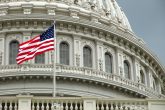October 22, 2020
Intelligence officials are now warning about election interference in real time
Early voting is well underway. Intelligence community and election security leaders know time is running out to get the right amount of accurate information out to the public to prevent a foreign adversary from influencing voters. Wednesday’s joint news appearance during television prime time by top intelligence and law enforcement officials was the latest and most dramatic step yet to warn Americans in real time about foreign governments’ efforts to influence the election. It took days, not weeks or months, for national security officials to determine who was behind the activities and communicate that information to the public. The coordinated news appearance also had the effect of letting adversaries know in a very public way that the U.S. government knows what they’re up to.
Time is running out to get the right amount of accurate information out to the public to prevent a foreign adversary from influencing voters.
Leading up to the 2016 election, the Obama administration was reluctant to release information publicly about the threat of foreign interference, particularly Russian operations. There were a variety of legitimate reasons for that — including, not insignificantly, the risk that releasing information would be viewed as politicizing intelligence, and more specifically, selectively declassifying information for the purpose of aiding Hillary Clinton’s campaign. At the time, Russian election interference activities were of such a scope and scale that they presented somewhat of a novel threat, and the idea of providing transparency about it was new, too. As a result, the October 2016 joint assessment by the Office of the Director of National Intelligence (ODNI) and the Department of Homeland Security (DHS) came late in the election cycle and was overshadowed by competing events and distractions.
Read the full article in The Washington Post.
More from CNAS
-
Sharper: National Security in a Divided Congress
Following the 2022 midterm elections, a new U.S. Congress was sworn in, resulting in a divided House and Senate with narrow margins. Key national security legislative items ar...
By Anna Pederson & Cameron Edinburgh
-
Western Hemisphere Migration is a Long-Term Challenge
Addressing western hemisphere migration should be a national and international priority....
By Carrie Cordero & Cris Ramón
-
The Lawfare Podcast: Klein and Cordero on the Latest FISA Numbers
To discuss the latest in FISA transparency news, the data and what it all means, Benjamin Wittes sat down on Lawfare Live with Carrie Cordero of the Center for a New American ...
By Carrie Cordero
-
Opportunity to Reform the Department of Homeland Security’s Biodefense Operations and Governance
If Russia were to engage in biological warfare against Ukraine, that act could embolden other countries to develop and use such weapons in other conflicts....
By Carrie Cordero & Asha M. George




